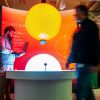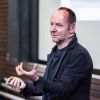Whether cancer research or recycling – quanta tap into knowledge
The sheer diversity of quantum technology: three pioneering research projects from Germany.

Germany supports numerous ground-breaking research projects dedicated to the next generation of quantum technology. Here are three examples:
Quantum gravimeter: how high is the groundwater level?
Climate change is resulting increasingly long dry periods. This also impacts groundwater, which accounts for up to 70 per cent of the drinking water used in Germany. At the moment, monitoring wells are mainly used to measure groundwater levels. Through the project Atomaqua, a so-called quantum gravimeter is being developed that will make it easier to track and analyse the formation of groundwater. The status of the groundwater can be determined with great precision, thereby enabling sustainable management in the agricultural sector.
Battery recycling at lightning speed
There is a high level of demand for lithium-ion batteries. But the raw materials required for the batteries are rare, and some are not even available in Germany or Europe. By means of clever recycling, it is possible to recover them from used batteries. The project X@Line aims to significantly simplify and accelerate the processes using quantum technology. Key material components are measured directly during the battery recycling process, thereby eliminating the need to send materials to laboratories. This previously took several days – the time can now be reduced to less than ten minutes. X@Line combines two X-ray analysis methods to create a new measuring method, allowing the proportions of lithium, manganese, cadmium, cobalt and graphite to be measured and the raw materials to be subsequently used for the production of new batteries.
New measurement method in the fight against cancer
Early diagnosis is crucial in the fight against cancer. The next generation of quantum technology enables a new type of microscopy: spectral resolution imaging promises to detect cancer cells at an early stage. The project QEED uses mid-infrared light to perform microscopic analyses of tissue samples using quantum sensor technology. The aim is to help detect cancer at an earlier stage. Unlike in the past, the tissue samples do not need to be dyed, and the measurement takes just two minutes. The expectation is that this simplified system can be easily integrated into clinical processes.


